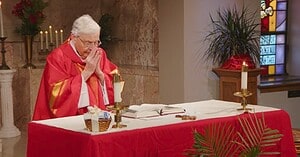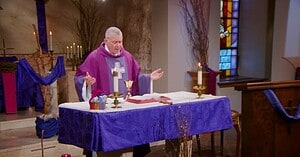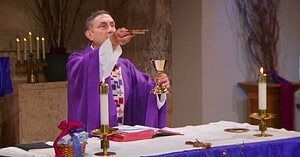Twenty-Seventh Sunday in Ordinary Time
Homily Video
Twenty-Seventh Sunday in Ordinary Time Homily Transcript
So the tradition has it that Moses wrote the first five books of the bible, the first five books of the old testament.
Now, I know there’s scripture scholars out there that would debate this, but let’s just take that as it is as the tradition holds it.
So Moses wrote the book of genesis and so on. Now he didn’t make these stories up or he didn’t make up this history. This was a history that had been told among the Israelites for centuries. It’s called the oral tradition.
But at some point, Moses, when he’s in the desert, he’s obviously got a lot of time on his hands, 40 years, he’s like, “you know what? I might as well write this stuff down.”
Now he writes down, though, this information kind of with a sort of a purpose in mind to help the Israelites who are struggling in the desert. So remember Moses is when the Israelites have passed out of slavery in Egypt, they’re making their way to the promised land.
The Israelites had been in Egypt for 600 years. That’s a long time. And so the culture and the customs of the Egyptians, the pagan culture has very much influenced the Israelites. So Moses got it kind of right to counteract that. One of the things the Egyptians did was that they worshipped many Gods and their Gods took the form of animals.
And so if you actually look, the ten plagues that Moses rains down corresponded to the ten Gods of Egypt. I shouldn’t say all the ten Gods are animals, but most of them are. So the 10 plagues correspond to the 10 Gods of Egypt. So for instance, like the Egyptian God Ra is the God of the sun. Well, Moses blots out the sun. The Egyptian God Hecate was a frog. Well, Moses rains down a whole bunch of frogs as a plague, as a pestilence upon the Egyptians.
So what Moses and God are basically telling the Israelites is, “Look, God is greater than these animals. You don’t worship the animals. They’re there to serve you.” Hence our first reading.
Now the other thing, so the Israelites are always tempted to go back to idolatry, to worshiping these false Gods of the Egyptians because they’re safe. They can control them and whatnot. The other thing the Israelites struggle with is sexual immorality.
So when Moses goes up the mountain to get the 10 commandments on Mount Sinai, he’s gone for 40 days. The Israelites, they make the golden calf. That’s their new God. And they basically have a giant party.
Now there’s probably children watching, so I won’t go into more detail about what that party consists of, right?
So they’re depraved because again, in a pagan culture, society, it’s just like, “Do whatever you want. There’s no custom.”
So that’s why Moses writes this law about divorce. He’s kind of going strong on it. And this is what Jesus is going to talk about in the gospel here today.
So we’re not here to worship animals. We’re not here to just do whatever we want with our bodies. We’re not here to objectify other people for our own pleasure. So anyways, this is kind of, again, Moses’ intent, what Jesus is going at as well.
Now, so marriage is sort of the theme. Let me just take a sort of a different approach here, all right? So we’re not called to objectify people, nor are we called to obviously objectify our spouses if we’re married or our friends or our partners, whatever. We’re also not called to objectify God. Now one of the ways we objectify people, think of how we treat our pets. Not that pets are bad. I mean, we love them, but we do treat pets or we should kind of treat pets differently than we do human beings.
Okay, so think about this. Your dog is there for your own purpose. We don’t lock a human being in a kennel when we go on vacation, right? Or we don’t, you know, just sort of yell at them when they’re not doing what we want. We don’t euthanize human beings, we might euthanize a dog or a cat. Would you die for your pet? Probably not, right? But you would die, of course, for your loved one, for your child and so forth.
So think of that metric and apply it to God. Okay, do we objectify God? You know, do you just kind of put God aside while you go to work during the day, the way you like put your pet aside and you just leave out some food and water and say, “Okay, I’ll check on you later.” And then you go on vacation, I’m going to leave the pet in the kennel. God, I’m not going to think about you during this time. Or you know what? God, you’re not behaving the way I like. I’m frustrated with all the violence in the world and so forth, so I’m just going to, I’m going to cancel you from my life.
All right, you wouldn’t do that with your loved ones. We shouldn’t do it with God. So evaluate your relationship with our lord. Treat it as like a marriage or treat God as your parent. It’s not meant to put a burden on you or make you feel bad or guilty, but it’s actually meant to help you live in freedom and peace.
The Egyptian Gods, the pagan society doesn’t give you that. Our lord and savior does.
Amen.
Readings
Featured Text
Discover More
Palm Sunday of the Passion of the Lord
April 13, 2025
Fifth Sunday of Lent
April 6, 2025
Fourth Sunday of Lent
March 30, 2025
Request Sunday Mass Guide
The Sunday Mass Guide sent to your home address
Spiritual nourishment and updates from the Sunday Mass community
Monthly reflections from Fr. Scott Donahue, our Principal Celebrant


